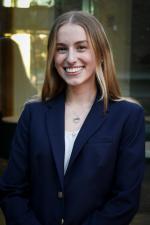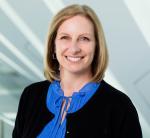Bridging the Gender Gap in Finance
March 4, 2024
Shannon O’Mara started work at Loomis Sayles in 1998 as a senior analyst. During the first 15 years of her career, the firm’s credit research staff had a fairly balanced ratio of male to female analysts. But by 2014, O’Mara had become associate director of research, and one of her responsibilities was recruitment and hiring for early career professionals. To her consternation, she found a lack of diversity in the candidate pool, which inspired her to do some digging. Looking at the numbers provided a sobering picture—out of more than 800 applicants, only 18 percent of the candidate pool consisted of women.
O’Mara knew representation and diversity of thought are invaluable to any organization, and she wanted to ensure that Loomis Sayles would continue to benefit from a variety of perspectives enriching its investment decision-making process. She also wanted to avoid reducing the number of women able to engage in rich and rewarding opportunities in finance.
“I knew there must be a way to capture the attention of female students at the undergraduate level before they made their decisions about where they want to go,” says O’Mara. “If we could show them that investment management is a rewarding career—that they could contribute and be valued—then maybe we could start to make a difference.”
That’s when O’Mara began building the program that became known as UWIN—the Undergraduate Women’s Investment Network. Since its inception in 2015, more than 250 students from 18 colleges and universities throughout New England have gone through the program, including 14 Isenberg students.
Mentorship, Professional Development, and Technical Training

“The program gave me an incredible network of industry professionals along with young women sharing similar ambitions,” says Marie Messinger ’25, an Isenberg finance major who participated in UWIN. “I learned so much from everyone involved with UWIN and would encourage anyone eligible to apply. It is an experience I will always be grateful for." Messinger has an internship lined up at Citi for summer 2024 and credits UWIN with helping to set her up for success.
Applications for the next class of UWIN students are due March 8.
UWIN students benefit from mentorship, professional development, and training in technical skills needed to succeed in the financial sector. Several have been selected for UWIN’s school-year rotational paid internship program at Loomis Sayles—gaining an even deeper level of hands-on experience.
Every UWIN participant is matched with a professional mentor to help make the connection between the educational experience and career paths available in the financial industry.

Isenberg finance major Marie Maher ’24 was paired with a mentor working in credit research, which matched well with her activity working with the Equity Fund at UMass. Maher will be joining Fidelity Investments after graduating this coming spring.
“The access to sincere, generous mentors was my favorite part of the program,” Maher says. “Everyone I spoke with was generous with their time and willing to help guide me in the right direction.”
Experiential training—from working on Bloomberg Terminals to experiencing a day in the life of a trader—is combined with workshops in presentation and self-promotion in the financial industry. Each student benefits from two 90-minute sessions with a communications consultant to help them learn how to get their voice heard effectively and how to get their points across impactfully.
“In the program, we expose students to as many people as possible,” O’Mara says. “They’ll meet a trader, a relationship manager, a product specialist, or an investment director.” Students meet with each person for about half an hour, and the program advises them to ask three questions:
1) What do you do every day?
2) What skills and attributes are needed for you to succeed at what you do?
3) What brings you joy?
“Seeing the variety of opportunities opens these young women to possibilities they might not envision just by sitting in a classroom,” O’Mara says.
Ada Nystrom ’26, currently an Isenberg sophomore studying finance, spent her first rotation of the UWIN program interning with the Private Credit Group (PCG), a newly formed team focused on originating, underwriting, and executing private credit deals, specifically in the private placement and specialty financing space. Nystrom is excited to expand on her classroom knowledge this year as the program’s first virtual intern, gaining even greater insights into the investment management industry.
Melissa Salva, the director of undergraduate career services at Isenberg, has been pleased with the experiences and opportunities Isenberg students have benefited from in the UWIN program.
“In the 12 years that I’ve been here, I’ve seen great attendance at the company information sessions with investment or finance firms, but it was always predominantly male,” Salva says. “So when Shannon from Loomis Sayles reached out to me directly, I was excited to take part. We’ve had 14 students take part so far, and the ‘special sauce’ of the program really seems to be the mentorship. Connecting female students with female mentors in the industry and discussing how to navigate a male-dominated industry, how to maintain confidence in that environment, and how to sustain a work-life balance—that experience cannot be replaced.”

O’Mara insists that the UWIN program helps her firm and the industry as much as it helps the students. “The students from Isenberg—I mean, clearly, they're focused on business,” she says. “That's our target audience—women who want to be in business, have taken some finance and accounting courses, and understand how business models work. I tell them: ‘look around the room—it's 100 percent women in the room. How many of your finance or business classes look like this?’ Of course, the answer is ‘none.’”